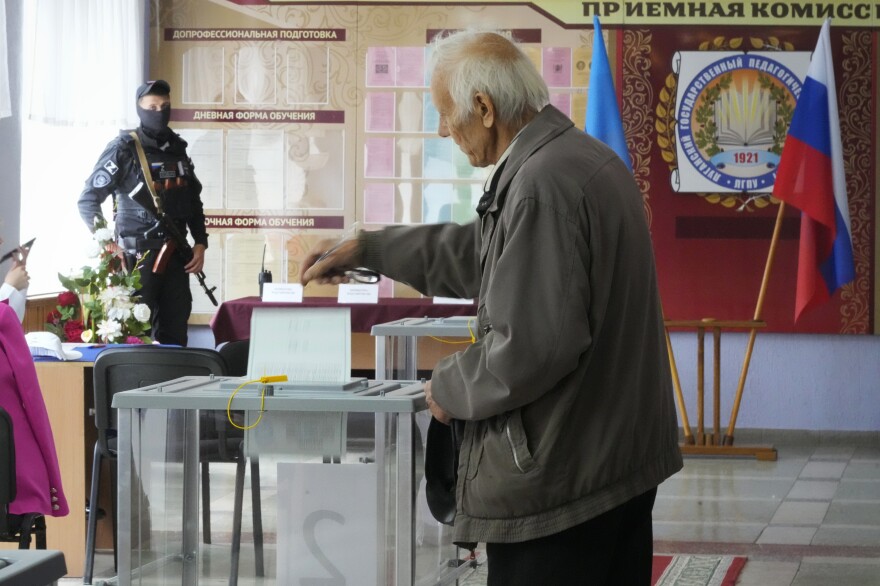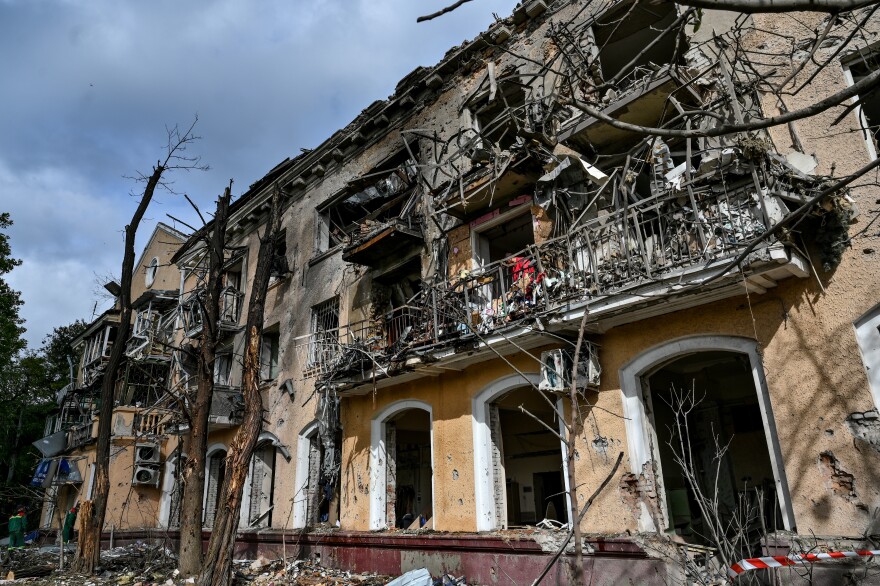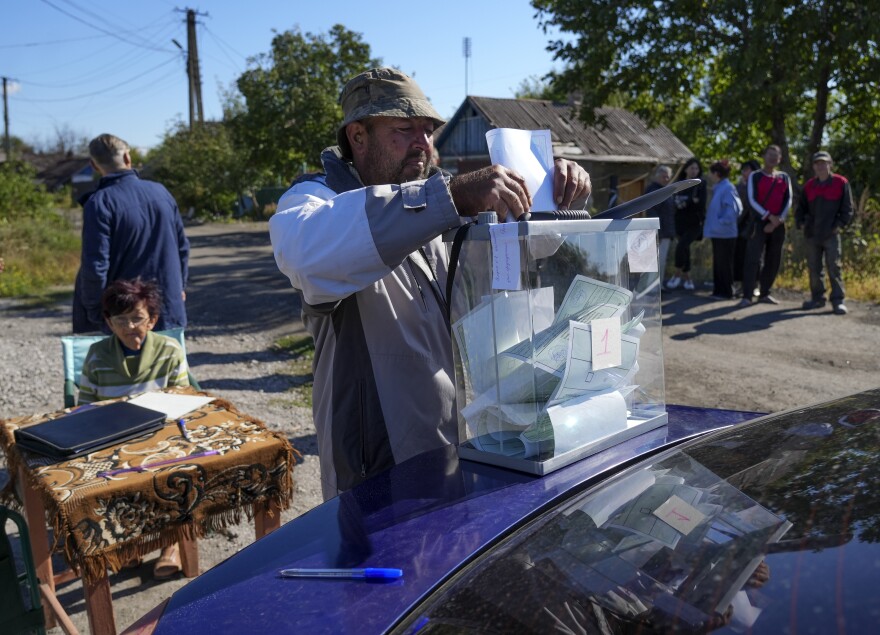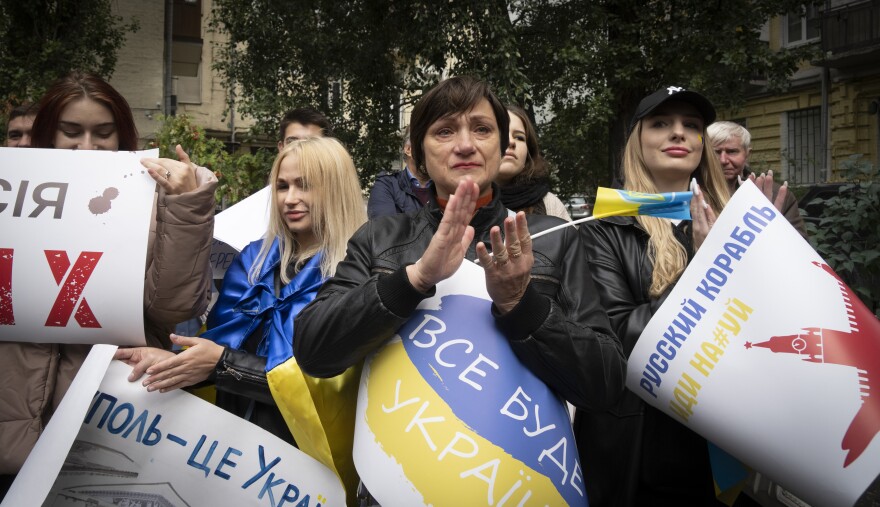Updated September 27, 2022 at 6:00 PM ET
KHARKIV AND ZAPORIZHZHIA, Ukraine, and MOSCOW — Four Russian-occupied regions of Ukraine appeared to vote overwhelmingly in favor of joining the Russian Federation, according to Russian state media. Ukraine and its international partners have dismissed the highly controversial referendums as shams and a violation of international law.
The Russian-run referendum votes took place over five days, from Sept. 23 through Sept. 27, despite international outrage.
The referendums are widely viewed as an initial Kremlin move toward formal Russian annexation of the territories, even as the exact timetable remains unclear.
Results reported Tuesday by Russian state media allegedly showed over 98% voting in favor of the measure in the self-proclaimed Donetsk and Luhansk People's Republics; while 93% voted for it in the Zaporizhzhia region and 87% in the Kherson region.

On Sept. 20, the day before Russian President Vladimir Putin announced a new military draft and a major new push in his war against Ukraine, officials in the Moscow-backed separatist regions of Donetsk and Luhansk announced they would hold the referendums on joining Russia. Authorities in occupied parts of the southern Ukrainian oblasts (regions) of Zaporizhzhia and Kherson quickly followed suit, declaring that they too would hold votes on whether to break away from Ukraine and become part of the Russian Federation.
All four of these regions are active war zones which many residents have fled, with reports of fighting and explosions on a daily basis.

Local Ukrainian officials reported numerous incidents of voter coercion in the five days of voting, with photos and videos popping up on social media indicating a process that was neither free nor fair.
One video widely shared on the Telegram messaging app and Twitter shows security footage purportedly from an apartment building in an occupied area, with two armed soldiers escorting officials carrying ballot boxes through a stairwell. Another video showed residents at a polling place filling out ballots with Russian officials monitoring across the table.
Most of the vote was carried out by poll workers — under armed guard — bringing paper ballots door to door, as the process was so rushed there wasn't time to set up more complex voting infrastructure, according to the Russian state news agency TASS.

Local officials only opened polling stations to the public on the final day of voting. Russia and its proxies also organized voting for Ukrainians who had fled to Russia from the regions amid the conflict. Russia's own Central Election Commission was tasked with monitoring the vote and the country claimed to have international observers.
The process — and outcome — was reminiscent of the Kremlin's hastily staged referendum in Crimea over eight years ago, after Russian troops seized that part of Ukraine in 2014. The official outcome of that referendum, which was also denounced as a farce by international observers, was that more than 95% of voters wanted to join the Russian Federation.
Following the vote, Moscow quickly annexed Crimea. In response, the U.S., the European Union and the United Nations all rejected the Crimea referendum as illegal and sanctioned Russia.
Western leaders say the elections in Russian-occupied parts of Ukraine are also illegal under international law and that they will not accept the outcome.
"Russia's referenda are a sham," President Biden said in a statement Sept. 23. "The United States stands with our partners around the world — and with every nation that respects the core tenets of the U.N. charter — in rejecting whatever fabricated outcomes Russia will announce."

On Tuesday, Secretary of State Antony Blinken said, "We will impose additional severe and swift costs on Russia for proceeding with the annexation" and will continue to support Ukrainian efforts to get back the land taken by Russia.
Ukrainian President Volodymyr Zelenskyy has said his country will never accept what he called "pseudo-referendums" and that residents in the occupied territories were forced at times at gunpoint to vote.
"This is an attempt to steal the territory of another state," Zelenskyy said in a remote address to the U.N. Security Council on Tuesday. "This is a very cynical attempt to force the male population in the occupied territory of Ukraine to mobilize into the Russian army in order to send them to fight against their own homelands."
Russian Ambassador to the U.N. Vasily Nebenzya dismissed the speech as a P.R. stunt.
Multiple Russian news outlets have reported that Putin will address his Federation Council, Russia's upper chamber of parliament, on Friday — a move widely interpreted as a chance for the Russian leader to celebrate the regions' "reunification" with Russia.
Yet a senior Russian lawmaker on Tuesday insisted the parliament would take no extraordinary steps to vote on annexation — a key formal step toward ratification — ahead of regularly scheduled parliamentary sessions starting next week.
Lonsdorf reported from Zaporizhzhia, Beaubien from Kharkiv and Maynes from Moscow.
Michele Kelemen contributed reporting from Washington, D.C.
Copyright 2022 NPR. To see more, visit https://www.npr.org.






